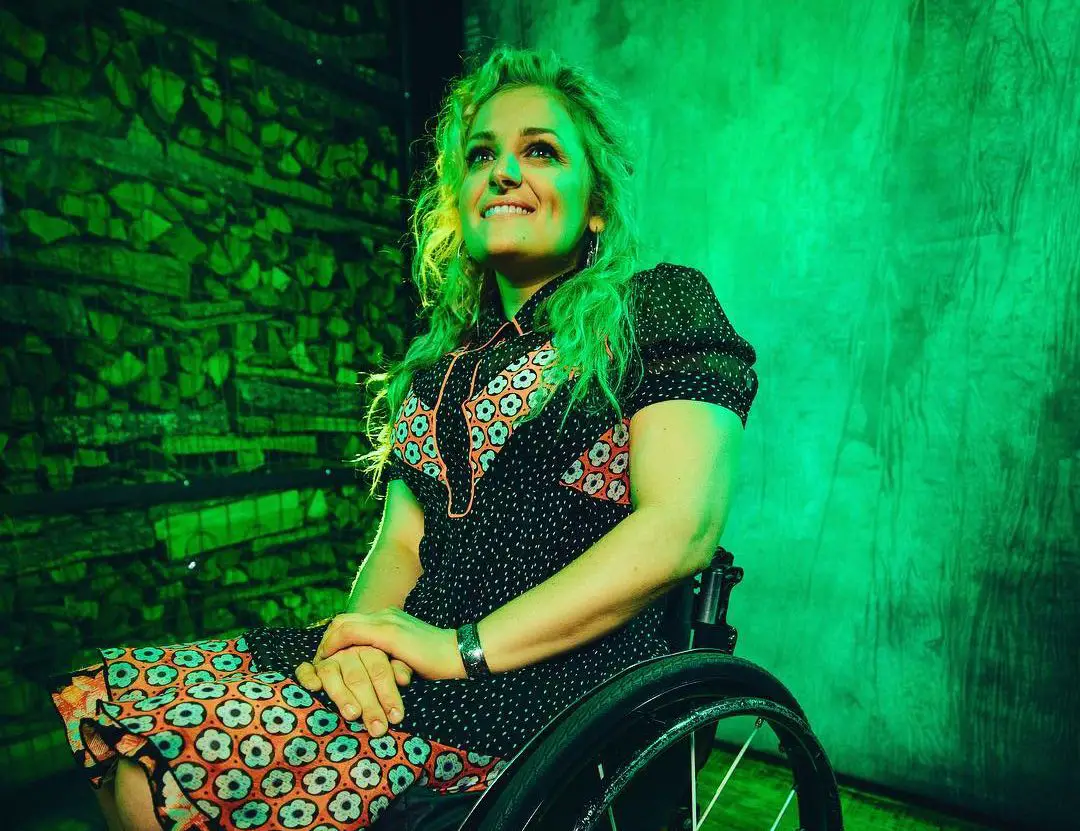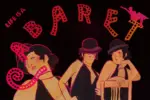In the months leading up to the 73rd Tony Awards, actress Ali Stroker performed a riotous number from the Broadway revival of “Oklahoma” on “The Tonight Show.” She belted her rendition of “I Cain’t Say No” with a fiery and passionate energy. Making use of a seven-piece band and a chic suede fringed jacket, Stroker plucked the audience into a world of cowbells, corn and unapologetic female lust.
She also performed the number while in a wheelchair. The 32-year-old actress, who has used a wheelchair ever since a car accident rendered her legs immobile as a toddler, is redefining conceptions of what disabled actors can accomplish in the U.S. theater industry.
Two months after her “Tonight Show” appearance, Ali Stroker won the Tony Award for best featured actress in a musical. It was the first time a wheelchair user had ever won a Tony Award. She even began her speech with a rheumy-eyed dedication to children with disabilities who aspire to join the industry in the future.
Stroker’s win represents a milestone for people with disabilities in the theater industry. At the same time, some aspects of her experiences in the theater illustrate how much work Broadway must still undergo before it can become truly accessible.
Stroker’s career has long been leading up to this moment. The New Jersey native first received public attention in 2012 for becoming a finalist on “The Glee Project,” a reality show that awarded aspiring actors with a recurring role on “Glee.”
She then made her Broadway debut two years later in the “Deaf West” production of “Spring Awakening.” This production placed actors with disabilities in the spotlight, and it featured deaf actors communicating in American Sign Language alongside singing, able-bodied actors.
In “Oklahoma,” Ali Stroker plays Ado Annie, a vivacious woman entangled in a love triangle with two young men. Actresses traditional portray Annie as a naïve woman whose promiscuity is exaggerated for comedic effect. Her open sexuality is supposed to be perceived as silly and unladylike.
In this production, however, Stroker’s zest and seductive dance moves allow Annie’s sexuality to come across more as empowering than foolish. This reimagined portrayal of the character — as self-assured and sex-positive — aligns with director Daniel Fish’s vision of reinterpreting “Oklahoma” to match our modern times.
https://www.instagram.com/p/Bvz8myOh1FS/?utm_source=ig_web_copy_link
In the 2019 production, Fish also includes a wall of guns on set — a choice that could be perceived as a critique of American gun control. The production also makes use of a video screen during scenes of violence to highlight the terror underpinning much of the play’s cheer.
Yet, Ado Annie’s embraced sexuality is a particularly poignant update, especially with Stroker helming the role. For many actors with disabilities, there are few available roles in the media that treat their characters as sexual beings.
In an interview for Vulture, Stroker expressed how she did not know it was possible for a disabled actress to be sexy. Actors with disabilities in the media are overwhelmingly asexual, but as Stroker says, herself and other disabled people can still be sexual people.
In a similar vein, Stroker’s performance also challenges preconceived notions of what it means for a disabled person to dance. The actress has an electric energy onstage, and she uses her body — from powerfully leaning forward, to launching her wheelchair into magnificent strides across the stage — to its maximum potential.
From afar, she looks like a wild cowgirl riding a stallion into town, buck wild and grinning from ear to ear. Her energy is the kind that one would expect to find in a rodeo, not a Broadway theater, and her swagger is palpable.
The American theater industry hasn’t always been a welcoming place for actors with disabilities. In fact, before Ali Stroker appeared in “Deaf West,” no wheelchair user had ever appeared on a Broadway stage. Even in Radio City Music Hall, the theater in which the Tonys were broadcasted, the actress had to enter from backstage because no ramp had yet been built connecting the audience to the stage.
After the performance, Stroker herself spoke out about inaccessibility issues in Broadway theaters. She noted that while many Broadway stages are themselves accessible, there are still many issues affecting theaters’ backstage spaces that prevent disabled actors from moving freely.
The actress advocated for accessibility just moments after receiving her Tony — no doubt while she was still giddy and reeling from her win — which demonstrates the urgency of the need for change in the American theater industry. If an actress receiving the most prestigious honor in her field immediately uses her win as a platform to help others, it a likely sign that her advocacy stems from a place grounded in truth and firsthand experience.
Stroker’s Tony win last June represents a glorious moment of overcoming adversity for disabled performers on Broadway. From emphasizing LGBTQ+ narratives to showcasing performers of color during the year of the hashtag #OscarsSoWhite, the American theater can often be a space where underdogs shine.
Let disabled actors now be the next group to have their turn in the spotlight, and may other industries soon follow Broadway’s flourishing example.
Stroker’s performance in “Oklahoma” earned her an opportunity to advocate to make the theater a more inclusive space. Ironically, this revival of a classic musical may be one of the most progressive outcomes of this Broadway season.
















